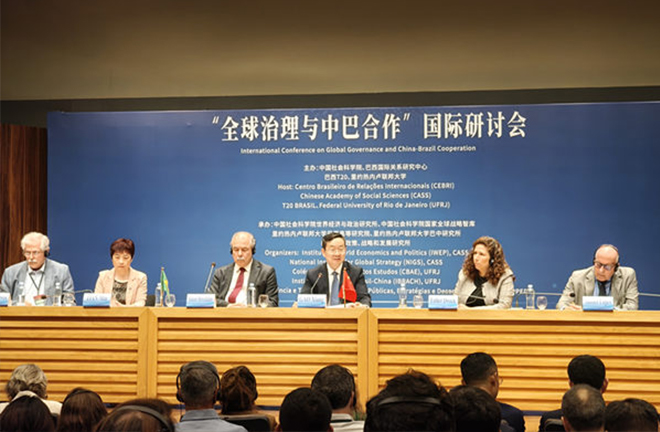T20 provides intellectual support for G20 on global governance

A scene of the International Conference on Global Governance and China-Brazil Cooperation, a T20 bilateral side meeting and one of the core side events of the G20
On Oct. 14, the International Conference on Global Governance and China-Brazil Cooperation was held in Rio de Janeiro, Brazil, as a Think 20 (T20) bilateral side meeting and one of the core side events of the Group of 20 (G20).
This year marks the 50th anniversary of diplomatic relations between China and Brazil and coincides with the G20 summit which will be convened in Rio de Janeiro this November. As an important “idea bank” for the G20, the T20 has set an irreplaceable stage for dialogue on addressing many global issues by building consensus.
Bolstering operation of G20
As a key platform for global economic governance, the G20 features a broad and diverse framework, covering a wide range of agendas with issues categorized meticulously. To be specific, the G20 summit has instituted various mechanisms tailored to different sectors, including the Business 20 (B20), which focuses on the business community; the Civil 20 (C20), aimed at promoting people-to-people exchanges; the Labor 20 (L20), dedicated to amplifying the voices of laborers, and the T20, which brings together think tanks from all over the world. These engagement groups complement each other, working in concert to support the G20 each year. Among them, the T20 has garnered widespread attention from international academia for its decisive influence on the implementation of G20 policies and initiatives.
Over time, the T20 has evolved from its embryonic form into an instrumental mechanism. The First G20 Leaders’ Summit, held in November 2008, established a vital platform for international cooperation, enabling major economies worldwide to collaborate on strengthening macroeconomic policy coordination and maintaining international financial stability.
“The T20 emerged during the Mexican presidency of the G20 in 2012, and since then it has continued to provide intellectual support for dialogues within the G20 framework by building a high-level international think tank network,” Wang Lei, deputy director of the Institute of World Economics and Politics (IWEP) at the Chinese Academy of Social Sciences, told CSST. “Since it was founded, the T20 has been committed to examining issues related to world economic growth and development from the perspective of think tanks, offering continuous knowledge, empirical, and intellectual support for the sound operation of the G20.”
In an interview with CSST, Gao Haihong, a research fellow and director of the Research Center on International Finance at the IWEP, shed light on the membership of the G20, saying that the group encompasses major global developed economies and emerging market economies whose aggregate economic output accounts for approximately 85% of the global total. In other words, the G20 is among the few international groups that bring together the developed and developing blocs.
Therefore, the G20 needs to identify common interests among its member states in areas such as financial stability, debt management, and development financing, while eliminating separatist forces internally to prevent geopolitics from affecting or disrupting economic issues, Gao said.
“During this process, the T20’s importance as a transnational think tank in bridging divides, removing misunderstandings, and promoting exchanges and mutual learning among civilizations is self-evident,” she added.
Expectations for China, Brazil
Over the past few years, the COVID-19 pandemic has continued to resurface, downward pressure on the world economy has been mounting, and globalization has faced significant setbacks. Major emerging economies have been the first to be affected by these interconnected factors. In the face of the dual challenges arising from domestic and international dynamics, China and Brazil have actively transformed their economic development models to address common difficulties.
As the leading organizations of the T20 designated by China and Brazil, respectively, the IWEP and the Brazilian Center for International Relations co-hosted the T20 side meeting: the International Conference on Global Governance and China-Brazil Cooperation.
As global governance faces various challenges, and China and Brazil embrace the 50th anniversary of diplomatic ties, the theme “Global Governance and China-Brazil Cooperation” of the T20 side meeting is propitiously timed, Gao said.
At a time when momentous changes of a like not seen in a century are accelerating globally, the world has become more fragile and unpredictable. “This means it will be tougher to build international consensus, highlighting the necessity for countries around the world to cooperate more closely,” Gao said. “As important member states of the G20, China and Brazil carry significant expectations. Looking ahead, both countries are anticipated to make more substantial contributions to the G20 within the T20 framework.”
As a new era of technological revolution and industrial transformation unfolds globally, countries are increasingly interdependent and interrelated in the economic sphere. Wang said that in this context, the T20 has been providing valuable insights for G20 dialogues. This will not only be of great significance for China and Brazil as they pursue development in a complex world, but will also inject confidence and hope into the world in practicing true multilateralism, deepening post-pandemic global cooperation, and overcoming development obstacles.
Edited by CHEN MIRONG
